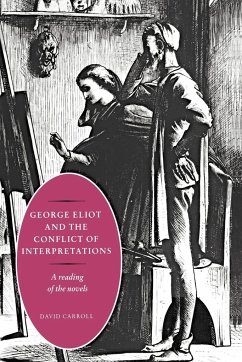Two versions of George Eliot, radical thinker and reclusive novelist, are brought together in this chronological study of her work. As a result, she is placed within the crisis of belief acted out in the mid-nineteenth century.
Two versions of George Eliot, both influential, have emerged from the study of her life and work. One is the radical Victorian thinker, formidably learned in a whole range of intellectual disciplines; the other is the reclusive novelist, celebrating through her fiction the communal values which were being eroded in the modern world. This chronological study of the novels brings the two together and places her within the crisis of belief and value acted out in the mid-nineteenth century. George Eliot saw this crisis as one of interpretation, in a vivid, almost apocalyptic awareness that traditional modes of interpreting the world were breaking down irrevocably. This study shows how, in response, she redefined the nature of Victorian fiction, testing to the point of destruction a variety of Victorian myths, orthodoxies and ideologies in each of her novels.
Review quote:
'Meticulously researched and cogently argued, George Eliot and the Conflict of Interpretations is not only the most sophisticated reading of and arguably the best introduction to George Eliot's novels to date, but also one of the most distinguished recent contributions to the intellectual history of the Victorian period. Carroll's wide-ranging book will be essential reading not only for all students of Eliot's novels, but for the growing number of cultural historians concerned with the interplay of intellectual contexts and literature in the nineteenth century.' Anglia
Table of contents:
Preface; Introduction: a working hypothesis; 1. Scenes of Clerical Life: familiar types and symbols; 2. Adam Bede: pastoral Theodicies; 3. The Mill on the Floss: growing up in St Off's; 4. Silas Marner: rustic hermeneutics; 5. Romola: duplicity, doubleness, and sacred rebellion; 6. Felix Holt: commentaries on the Apocalypse; 7. Middlemarch: empiricist fables; 8. Daniel Deronda: coercive types; Conclusion; Notes; Index.
Two versions of George Eliot, both influential, have emerged from the study of her life and work. One is the radical Victorian thinker, formidably learned in a whole range of intellectual disciplines; the other is the reclusive novelist, celebrating through her fiction the communal values which were being eroded in the modern world. This chronological study of the novels brings the two together and places her within the crisis of belief and value acted out in the mid-nineteenth century. George Eliot saw this crisis as one of interpretation, in a vivid, almost apocalyptic awareness that traditional modes of interpreting the world were breaking down irrevocably. This study shows how, in response, she redefined the nature of Victorian fiction, testing to the point of destruction a variety of Victorian myths, orthodoxies and ideologies in each of her novels.
Review quote:
'Meticulously researched and cogently argued, George Eliot and the Conflict of Interpretations is not only the most sophisticated reading of and arguably the best introduction to George Eliot's novels to date, but also one of the most distinguished recent contributions to the intellectual history of the Victorian period. Carroll's wide-ranging book will be essential reading not only for all students of Eliot's novels, but for the growing number of cultural historians concerned with the interplay of intellectual contexts and literature in the nineteenth century.' Anglia
Table of contents:
Preface; Introduction: a working hypothesis; 1. Scenes of Clerical Life: familiar types and symbols; 2. Adam Bede: pastoral Theodicies; 3. The Mill on the Floss: growing up in St Off's; 4. Silas Marner: rustic hermeneutics; 5. Romola: duplicity, doubleness, and sacred rebellion; 6. Felix Holt: commentaries on the Apocalypse; 7. Middlemarch: empiricist fables; 8. Daniel Deronda: coercive types; Conclusion; Notes; Index.


